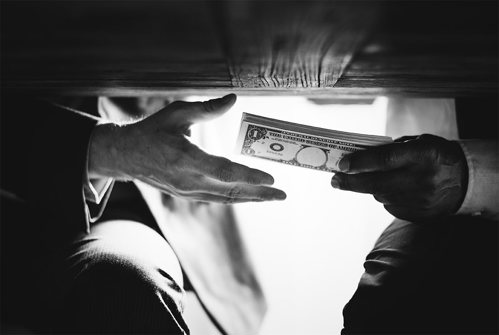FTX Fraud – Lies and Obfuscations
In his media campaign, Sam Bankman-Fried has been trying hard to hammer in an image of a well-meaning but inexperienced CEO, who simply made a mistake. To be honest, there is a huge list of companies that made unwise investments that put them in the red. This is why doing profitable business requires knowledge, skill, and expertise. The level of foresight to deposit funds prudently can make or break a company. Experienced investors understand this, and no investment is without its risks
However, there is a huge difference between putting your money into a risky investment, and when a company embezzles your funds. The FTX crypto scam did just that. SBF is trying his best to spin the story of FTX in the direction of oblivious mismanagement, rather than fraud and deliberate extortion of crypto investors’ funds.
As more and more evidence emerges it becomes clear that the FTX group was deliberately deceiving people and they knowingly committed financial crimes. In this article, we will cover dubious tactics that FTX fraud had used to cover their schemes, for additional content on FTX be sure to check our blog page.

Damage control – Playing Dumb
Several days prior to declaring bankruptcy FTX founder Sam Bankman Fried made sure that his post circulated on Twitter in which he claims he “f*cked up”, pardon his French. The entire ordeal was presented as a highly unfortunate faux pas and a lapse of judgment. A lauded genius decided to go for the defense of miscalculation, stupidity, and lack of experience rather than fraud. Naturally, people were outraged and furious.
SBF is trying his best to frame having lost billions in customers’ money as an honest mistake with an oops-a-daisy on top. Similarly, various media outlets highlight sensationalist details of the SBF’s clique who was managing the whole company. They present them as a polyamorous drug-abusing team of inexperienced semi-adults. As much as that makes a provocative read, it supports the narrative of FTX fraud just being them crazy kids getting in over their heads.
It’s certainly true that the FTX team wasn’t aware of how brittle their multi-billion house of cards was. Nevertheless, it would be incorrect to assume they weren’t conducting fraud knowingly and deliberately.
Alameda and FTX – Illegal Bedfellows
In 2017 SBF founded Alameda Research and quickly enough in 2018 he made a fortune trading on the discrepancy in price between Japan’s Bitcoin price and the rest of the world. This gave Sam a reputation as an expert in cryptocurrency exchange. So when in 2019 he Founded FTX, the world gobbled up the advertising behind it – a revolutionary company led by a quirky genius billionaire with altruistic ideals. FTX quickly became one of the largest crypto exchange companies, holding the place of the third biggest crypto exchange platform in volume.
Right from the beginning, many expressed their concerns about the striking conflict of interest. Two large crypto service providers were run by the same man. However, Sam quickly assuaged all the concerns, leaving the position of Alameda’s CEO and concentrating solely on FTX. He stressed that the two companies are completely separate and independent. What’s more, his team has ensured this is the case, enforcing stringent measures and putting up ‘walls’ between companies. This all turned out to be a gross lie.
During the controversy surrounding the FTX group, it was discovered that, though certain systemic roadblocks were in place, Gary Wang, one of the leading members of the FTX clique, installed a special code secretly. It worked as a back door of sorts, enabling the two companies to exchange funds freely and without a visible trail.
This enabled FTX group to secretly transfer customer funds to Alameda, where they were invested in risky trades. As of December 2022, it is still unclear what happened to this money. Unfortunately, this was the worst offense, but it wasn’t the only one.
Problematic Audits
In July 2021 SBF circulated on Twitter how “FTX became the first (?) crypto derivatives exchange to complete a GAAP audit. Just to clarify GAAP stands for Generally Accepted Audit Standards. The promotion of this news was to reaffirm the status of FTX as an exemplary company.
Practically speaking, FTX had the funds to hire the cream of the crop of accounting finance professionals. Still, two separate companies did the audit – Preger Matis and Armanino. In hindsight, some experts comment how the companies were too small to correctly perform their duties, while others conclude that they were wilfully blind to the bad state of the books. Regardless, John J. Ray III the new CEO of FTX states that these audits shouldn’t be considered trustful.
Whether the companies were too small for the damaging mess that was FTX, or they were paid to give a fraudulent report, all evidence points that SBF abused their problematic and unrealistic evaluation to hide the real state of his company.

Problematic Hires
Essentially, the main players and decision-makers behind Alameda and FTX were a clique of friends. Though these two companies were built on nepotism, in the beginning, this played to their advantage: A group of young visionaries was set on changing the world. As unprofessional as it was, Sam surrounded himself with close friends. However, one person stands out – Dan Friedberg, who was the chief regulatory officer of FTX.
This certainly falls under the ad hominem argument, but we have to point out that prior to the involvement with FTX, Mr. Friedberg was involved in a large-scale scandal. Reportedly, individuals who played poker online on the Ultimate Bet platform were given the chance to view the other players’ cards, thus effectively cheating. After this became public, Dan Friedberg participated in the media damage control and coverup.
This raises a question – Why would SBF hire someone who has such a large stain on their resume?! It’s not like FTX couldn’t afford someone more prestigious since they could hire anyone they want. Eventually, they chose Dan Friedberg, a man infamous for scheming and coverups. Although by no means is this a smoking gun, it is highly telling of malicious intent.
No Regulatory Oversight or KYC from Financial Institutions
There are sets of laws and a robust system of policies regarding the institutions that handle third-party funds, in layman’s terms – if you handle other people’s money, you are going to get investigated. After the crash of the FTX crypto fraud, everybody was quick to point at the glaring red flags regarding mismanagement, mishandling of customer funds, and illegal activities. If these issues were glaring, why hadn’t financial institutions and regulatory bodies reacted sooner?!
It’s the fiduciary responsibility of banks and crypto exchange platforms, to guard their clients’ assets. Without this solemn promise that the banks would look after their customer’s money, the whole banking system would crumble. Ultimately, the FTX scam wouldn’t have embezzled such a large amount of funds, if relevant institutions had done their job.
You Have the Right to Reimbursement
Understandably scores of people are furious for having lost their money to the FTX scam. Sadly, many of these crypto investors lost their life savings or worse. Since Sam Bankman-Fried has filed for bankruptcy, the process of liquidation has started and the bankruptcy courts will discern how they’ll distribute the funds to the victims. If your country offers this service to the victims of the FTX scam you can apply for reimbursement.
Additionally, you can join a class action lawsuit or hire a lawyer and litigate individually. Needless to say, legal help can be quite expensive, lengthy, and nerve-wracking. Years may pass before an FTX victim receives any of their money if they get any at all.
There is no need to despair and quit because we at Funds Retrieval have a solution for you. Our company is dedicated to fighting scams and helping defrauded people get their money back. We have a team of legal and financial experts who are ready to take on your case and dispute your charges with financial institutions who failed you to guard your funds. You can always book a free consultation on our site, so contact us now.
